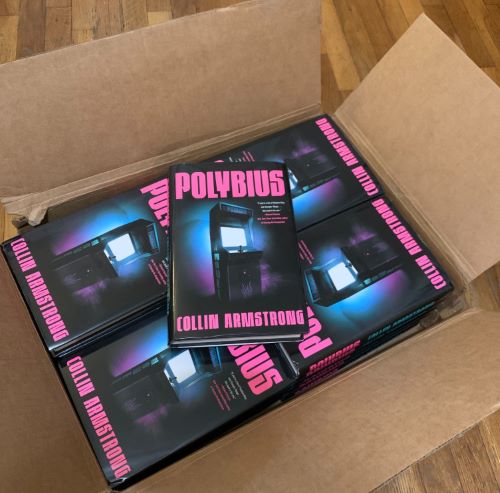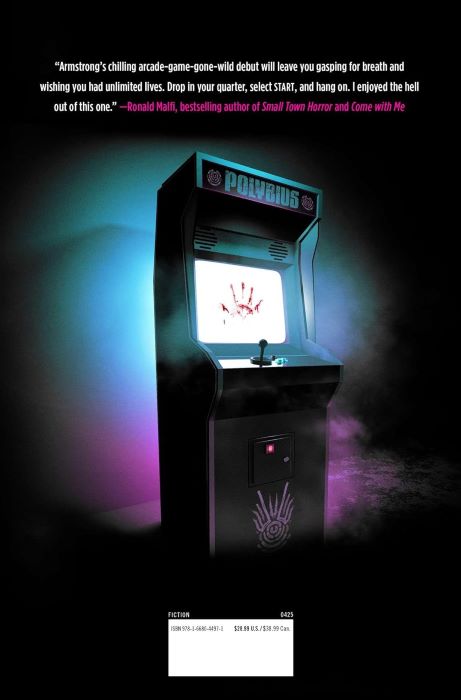Okay, truth time. When I requested Polybius, the debut novel by author Collin Armstrong, I did it based on the synopsis in the email. It wasn’t until I was already reading the book and Googling how to pronounce it that I learned that the story of Polybius is actually a pretty popular urban legend. Interesting, right? I’m so glad I went in blind though because I feel like it allowed me to just go along with the story in the book rather than trying to compare it with what is found online.
October, 1982. Forced to move to the quiet seaside town of Tasker Bay by her mother, the only thing on high schooler Andi’s mind is saving up enough money to return to her old stomping grounds in Silicon Valley. Her self-taught skills with all things electronic make her a perfect fit for a job at the dingy local arcade where she can tune out from life and bankroll her eventual escape.
Pining over the distant and aloof Andi is Ro, the son of Tasker Bay’s sheriff, who begins spending more time at the arcade. Despite promising herself she wouldn’t get attached to anyone in town, Andi finds herself opening up to the thoughtful, like-minded Ro.
When Polybius—a new bleeding-edge game of unknown origin arrives—the shop is suddenly overwhelmed with players fighting for time on the machine. Seemingly overnight, a virus-like epidemic grips Tasker Bay while a violent coastal storm rolls in, isolating it from the outside world. People begin experiencing fits of anger, paranoia, and hallucinations—no one can be trusted. After a grisly act of violence goes unsolved, the town descends into chaos. Is the arrival of this mysterious game and the disorder in Tasker Bay a coincidence? Convinced the dire situation is somehow linked to Polybius, Andi and Ro desperately search for clues that might stop the spread before they, too, begin experiencing side effects…
To celebrate the release of the book, I chatted with Collin about the legend behind the mysterious video game, how the book came about, horror movies, and more!
PopHorror: I really loved Polybius and I’m super excited to talk to you about it today.
Collin Armstrong: Thank you!
PopHorror: Polybius is somewhat of an Urban Legend. While I Googled it and have a bit of background information, if you could please give our readers some background on Polybius and how your book came to fruition.
Collin Armstrong: Sure. The story goes that in the early 80s in the Pacific Northwest, in most tellings it’s in different areas around Portland, there were these games that started showing up in local arcades. It’s a game called Polybius. A few cabinets popped up at a few different arcades. The game was kind of unheralded. No one really knew about it, knew where it came from, didn’t know the manufacturer, it wasn’t in any trades. It was very graphically sophisticated. It had a kind of unique play style, and it was very addictive. You had kids lined up out the door to get their time in front of the cabinet. What started happening though, was that some of these kids would then start to exhibit strange symptoms after playing. They would be depressed or aggressive or kind of disassociated. There were even stories about a couple people committing self-harm after having played. There were also anecdotes involving, at a few locations, people men in black style coming into the arcades and plugging some sort of arcane device into the cabinet and pulling data off it. Like nobody was quite sure what they were doing. Eventually the cabinets disappeared. No one knew where they came from, no one knew why they left or where they went. In the late 90s, the story started making appearances online but at that point in time, it was not really part of the cultural mainstream in the sense that you might consider it to be now or even in the few years post that initial mention because around 2003, GamePro magazine had an article online that went into detail about different myths and legends associated with video games and one of them was Polybius. That was really when it kind of became part of the urban legend canon or started to become. For me personally, I first heard about the legend in the mid-to-late 2000s, so shortly after the GamePro article. I knew right away that there was something there. It combined all these things that I liked. It was kids in arcades in the 80s and I saw the potential for it to be some kind of chasing down this mystery of what the game is and what it does against this ticking clock of if you played, how long is it going to take to get you or how long is it going to take to destroy your home town or to spread? It also made sense for something that I had been looking for a vehicle to, like a story to tell and that was a coming-of-age story, like a dark coming-of-age story. I grew up in the 80s and 90s reading Stephen King, and John Saul, and Dean Koontz, and certain books within their canons are that, are about kids experiencing these situations that maybe parallel some of the difficulties they’ll face later in life, of course amplified to horrific extremes but nevertheless, there’s a human element to it that I thought, I always had wanted to tell a story like that and Polybius gave me an avenue to do that.
PopHorror: I am a sucker for the 80s so this was right up my alley. And this story is so interesting and intriguing. Was there anything that you were adamant about keeping in the final draft, no matter what?

Collin Armstrong: Yeah, sure. The first draft, I think was around 460 pages and the published draft is going to be right around 330, 330 and change. I’m not quite sure off the top of my head, so there was a lot that was cut from the book. There were whole characters and subplots that were excised. In hindsight, there’s nothing where I think, darn, I wish we had kept that in there. I think they were all smart cuts. The one kind of big sequence that was up for discussion that I was adamant we had to keep is a later chapter that involves one of the central characters. She’s the town doctor who goes to make a house call where this single mother has two children who both have been exposed to the game and who both increasingly just disconnected from reality and are exhibiting these strange and frightening symptoms and the mother doesn’t know how to deal with them. She calls the doctor but ultimately, the situation is so combustible that there’s no way for her to solve it. It was important for me to keep that scene in the book because it did a couple of things. One, it’s a very horror-forward sequence. I think it’s one of the scarier sequences in the book. I also think it’s important because it helps to underline how the game works to an extent, because not everybody… Without giving too much away, the logic behind the game, it was created for a certain purpose and dropping it in a town and affecting the population has to do with that purpose. So, if you and I are residents of the town and I play the game and you don’t, well, the game didn’t get you. But if you know me and suddenly I’m acting strange or I’m aggressive towards you or you’ve seen me do something odd or you’re worried about me, it is getting itself inside your brain sort of indirectly. I thought that was an important idea as far as the why behind the game that the characters gradually uncover. They conduct this amateur investigation as to where the game came from and what its purpose is. I thought this scene, in addition to being a well-paced horror scene, also was important because it’s helpful in underlining exactly how the game is designed to work.
PopHorror: It ties into something that’s said later in the book about how the game not only affects those who played but also affects those who didn’t. Andi and Ro’s experiences are way different than the family that Rachel visited. It also showed us how the game affected everyone differently because what was happening with Ro is not what was happening with the son and daughter in the other family. While Ro was a narrator, we didn’t get a lot of what was going through his mind during his “episodes,” where when Rachel was talking to the little boy, he was explaining what he was seeing. I’m glad that you left that section in the book because I feel like it was pretty important to the story.
Collin Armstrong: To your point about the way that it affected Ro or what we do and don’t hear from him, that does come down to the character’s point of view. Ro is someone who keeps thing close and doesn’t know what’s going on, and at a certain point in time, realizes that it isn’t that he’s fucked up. He didn’t do anything wrong other than play, but he knows now that there’s something wrong with him. Something has happened and he’s trying to figure out, is this something that I can get away from? Can I do something about it? He’s kind of holding on to that hope but at the same time, he doesn’t necessarily want to admit it. It’s the person in a zombie story who got bit by a zombie but doesn’t want to tell anybody. There’s a lot of zombie DNA in this book. It is about a group of people holding out against a brain dead horde that’s slowly converging. I’ve always thought of it a little bit as, there’s definitely a zombie quality to it. That, for him, I think was important, and it’s also important that the game kind of plays on your brain and no two brains are alike. The things that it makes manifest within you that push you over the edge are going to be different person to person. And you see that across other characters in the story too. I had to figure out a way to channel the game and to personify it, and that personification takes the form of Mal, the owner of the arcade and is sort of like this wannabe gangster, but he’s also just a chicken shit. He’s like a fake tough guy. But of course the game, cut within him, unlocks what he would believe is his true potential. It lets him become this awful person he’s always imagined himself to be. That for him is very different and almost weirdly empowering after a certain point in time, whereas for other people, it’s incredibly debilitating. But it doesn’t make Mal any less dangerous than it does someone who’s afraid. Someone who’s embracing it is just as frightening, if not worse. They’re all different.
**Author’s note: Here is where I would put the portion of our interview where we discussed who should be cast as Andi and Ro if Polybius was made into the movie, if I had remembered to hit record on my digital recorder (must have been amateur hour). But since I didn’t, I am not able to include it. We both could not come up with anyone at the time.**
PopHorror: This was your first book, right? This is your debut.
Collin Armstrong: Yes!
PopHorror: What is up next for you?
Collin Armstrong: Well, that’s the whatever dollar amount question. I have two proposals out right now that we’re trying to find homes for, and we’ve been having conversations with other publishers. I had primarily worked in film and television so I’m in the middle of revising a script right now for a producer and director that may or may not move forward. You never know with any of these things. As far as writing another book goes, the process was so great and so different, and it allowed so much more of your voice and your thoughts to come through that I would love to keep doing it. The concepts that I’ve been working on are somewhat strategically also about kind of urban legends or myths and superstitions so there’s a little bit of connective tissue in terms of concept between the books. But we’ll see. I don’t know. Let’s see what’s next. You never know.
PopHorror: I like that. I like urban legends so that’s intriguing. I really enjoyed Polybius so I’m excited to see what you have coming up next for us. One last question for you today. What is your favorite scary movie?
Collin Armstrong: It’s tough to say like favorite, favorite. I guess, because it is maybe my favorite movie of all time and you could say that it is a scary movie, I would say Return of the Living Dead. The Dan O’Bannon, 1984, side story of Night of the Living Dead. That’s a weird movie to say as your favorite movie of all time, I totally understand. It just caught me at the exact right moment. I taped it off TV so I’m going to date myself already by explaining that I had a VCR and they used to show movies on television and you used to tape them. That was the first time I saw it and it was just so smart and clever, and it was such an interesting take on the zombie mythos. I hadn’t seen anything like it before.

Thank you so much to Collin for taking the time to chat with us. Polybius will be available wherever you buy books on April 29, 2025!





